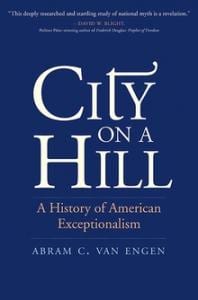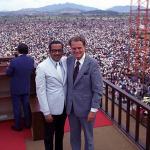I am excited to welcome Abram Van Engen to The Anxious Bench. Van Engen, Associate Professor of English at Washington University in St. Louis, is the author of City on a Hill: A History of American Exceptionalism. The book begins with a careful examination of what has become the most famous sermon in American history. Then, Van Engen moves from the seventeenth century to the present, examining how many Americans have made use of the Puritan in attempts to define their country’s meaning.
 JT: Historians have been writing about Winthrop’s sermon for years. What’s new in your analysis of this text?
JT: Historians have been writing about Winthrop’s sermon for years. What’s new in your analysis of this text?
AVE: My book uses the sermon to talk more broadly about American exceptionalism. It is the story of how the Pilgrims and Puritans became mythologized as a national origin to explain the identity and purpose of the United States ever since. That’s how President Reagan used Winthrop’s “city on a hill” sermon. He claimed that this particular text from 1630 began the mission he was still fulfilling in the 1980s. I wanted to explain the larger context of how and why the Pilgrims and Puritans came to serve such an important role in American cultural and collective memory.
I also have different readings of the sermon itself—including how it works with scripture, what Winthrop was actually trying to say, and why it seems that the sole surviving manuscript has come down to us corrupted and incomplete. But mainly I wanted to tell two big intertwining stories of American culture. First, the broad tale of how the Pilgrims went from a mostly-regional, mostly-ignored, and mostly-unsuccessful settlement in Plymouth to a foundational story celebrated by presidents and politicians. Second, how a lost and forgotten text, unpublished and unknown, was found, printed, publicized, and finally rose to become a classic text of American history and literature. Together, these rags-to-riches narratives reveal the many different meanings of America that emerge from rediscoveries, reinventions, and reinterpretations of its past.
JT: In the course of the (probably incomplete) sermon as we have it, Winthrop touches on so many things: the God-ordained inequality among humans, the necessity of spiritual regeneration to overcome self-love, the necessity of Christian love for the colonial venture to succeed, and the covenant between the colonists and God. Is there a central message? What holds this sermon together?
AVE: In my book, I argue that one central passage from scripture holds this all together: Galatians 5:13-14. What seems like a series of discrete messages and distinct parts actually makes sense if we understand Winthrop to be unfolding those verses. Historians have argued for years about the relationship between the first part of the sermon (which seems to be all about economics, social hierarchy, and exchange), and the second part (which centers on love within the covenantal community). But all of that makes sense if Winthrop is trying to explain and apply Paul to a new colonial settlement. Winthrop was trying to preach a liberty enlivened and constrained by love—a community of mutual affections that would set the needs of others above oneself. Galatians 5:13-14 provides a roadmap to the sermon. The first part of the sermon asks: what do we owe one another? The second part answers: whatever love requires.
JT: Few Americans paid any attention to the sermon until Perry Miller and then Sacvan Bercovitch popularized it in the mid-twentieth century. Who knew that historians have so much sway? Why did so many Americans – and American politicians in particular – latch onto the “city on a hill” idea in the second half of the twentieth century?
AVE: The sermon came to fame in large part because of the Cold War. In the nation’s rise to power, many prominent Americans began searching for a sense of national purpose. Responding to this concern, the influential media man Henry Luce pulled together a group of well-known politicians, poets, journalists, preachers, and historians to answer the question. “More than anything else,” he wrote, “the people of America are asking for a clear sense of National Purpose”—something to set against the Soviet Union. That was the larger context which gave Perry Miller’s assertions such influence. According to him, Winthrop’s sermon had established the true origin and identity of America in 1630 when he called us to be a “city on a hill.”
In the 1970s, Sacvan Bercovitch elevated Winthrop further. He was a Canadian scholar at Harvard, and he claimed to be forever confused by American rhetoric. Only Americans, he said, believe themselves to be God’s chosen people, called upon to spread their blessings abroad. And they got this way, he argued, because of the Puritans. In case anyone doubted him, Bercovitch could always point to exhibit number one: Ronald Reagan, who steadily built his career on a Puritan sermon.
Even though Bercovitch was critical of Reagan, therefore, the two of them oddly worked together in this regard. Reagan broadcast Winthrop’s sermon from the bully pulpit and Bercovitch proclaimed it from the classroom lectern. Both of them botched the meaning and history of Winthrop’s sermon, but together they made it rise.
JT: I’ve often been puzzled at scholarly discussions of “American exceptionalism.” It’s a fuzzy concept. What exactly do you mean by the term?
AVE: American exceptionalism is first a comparative claim. It says that “America” (usually understood as the United States) differs from the rest of the world, usually in a superior way and often with a sense of divine destiny—that God has singled out this nation for some higher cause. But always, behind these claims, there is something else: a history. American exceptionalism is finally a story of America. In 2012, the Republican Party Platform defined American exceptionalism as “the conviction that our country holds a unique place and role in human history.” That sums it up fairly well.
In order to assert that unique place and role in human history, American exceptionalism relies upon origin stories and national narratives. And that is where the Pilgrims come in. The Pilgrims became pivotal to American exceptionalism because they could be re-crafted into an exceptional origin themselves. Orators and textbooks from the early 1800s presented the Pilgrims as widely different from all other colonial ventures. Pursuing God, not gold, and seeking freedom, not gain, the Pilgrims supposedly initiated a story the world had never yet seen. American exceptionalism has traditionally understood the United States as the unfolding of these “first” principles.
JT: How is it that so many politicians (on both sides of the aisle) have harnessed Winthrop’s sermon to buttress their visions of America?
AVE: I think it is the power of American exceptionalism to charge the present day with purpose that finally turned it into a rhetoric embraced by both left and right. The left has traditionally been more skeptical of American exceptionalism (it was never in their party platform, for example). Many scholars, meanwhile, have sought to highlight and include all that American exceptionalism often erases: not just the atrocities of the past, which cannot be ignored, but the contributions, ideas, and cultures of all those who are not descended from the Pilgrims and all those who have lived beyond the borders of what is now the United States. The point is not to invert a national narrative, but to see with clear eyes both the good and the bad—and all that falls in between.
All the same, by 2015 both Hilary Clinton and Barack Obama were openly declaring full-throated support for American exceptionalism—but in ways that sought to highlight diversity and emphasize a sense of progress rather than arrival. For Reagan, the United States was called to remain a “city on a hill”; for Obama, the United States was called to become a beacon to the world. And he made his point, like many other Democrats have done, by citing Winthrop’s sermon. Winthrop calls on his followers to “rejoice together, mourn together, labor, and suffer together, always having before our eyes our commission and community in the work.” Barack Obama, Bill Clinton, Elizabeth Warren, and many other Democrats have recited these lines.
In other words, however they conceive of American exceptionalism—however they narrate the meaning of American history on the political stage—both the left and the right have turned to Winthrop to tell their tale.
JT: In your closing chapter on Donald Trump and “America First,” you suggest that now that historians have torn to shreds the flimsy foundations of Pilgrim/Puritan-linked American exceptionalism, we might miss it. Now we’re just left with greedy defenses of American sovereignty. Am I reading you correctly? Do we need some sort of more inclusive, less date-specific, less Christian, less Eurocentric American exceptionalism?
AVE: The best part about being a scholar is that I do not need to be a politician. The tasks and methods differ. Good politicians might sometimes need to conform their work to certain terms of American exceptionalism in order to get the job done. Good historians do not.
In my last chapter I explain how “America First” differs sharply from the rhetoric of American exceptionalism. American exceptionalism narrates a history based in high ideals, like liberty, democracy, self-government, prosperity, and so forth. It is often blind to anything in American history that contradicts those ideals—and blind as well to the way other countries instantiate those ideals—but it is nonetheless a language of history and a language of ideals.
America First is not. It doesn’t bother with history. It has little interest in discussing democracy, liberty, or all the rest. It is a language, instead, of sovereignty and self-interest. Those are the twin concepts that matter most. In the rhetoric of America First, every nation is basically the same: each is locked in a zero-sum struggle, where the point is to win and where winning makes others lose. “I want to take everything back from the world that we’ve given them,” Donald Trump declared. When he won the 2016 election, he never embraced American exceptionalism and never referred to the United States as a “city on a hill.” In fact, those who turned to this rhetoric on both the left and the right were those who most strongly opposed the rise of Trump.













